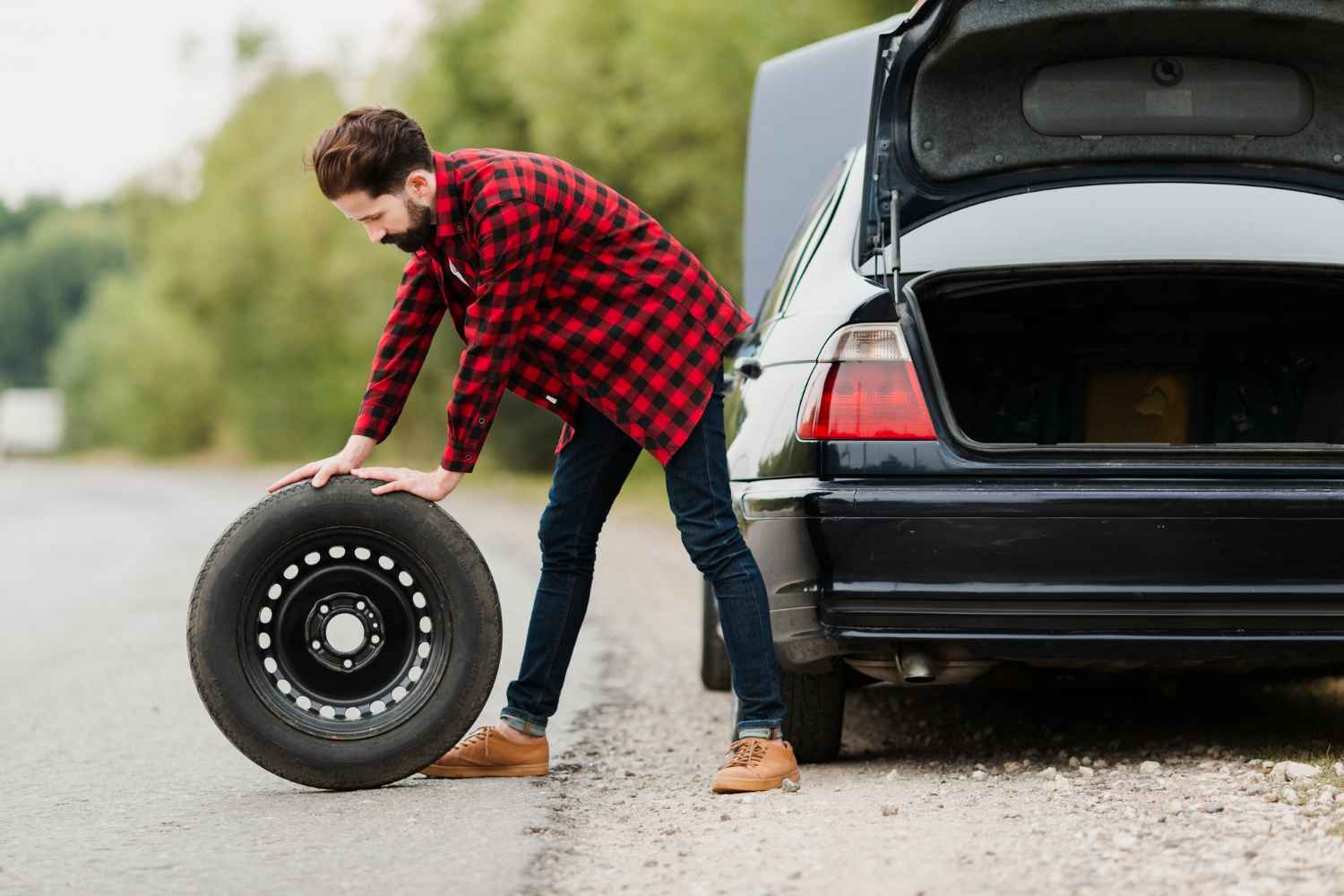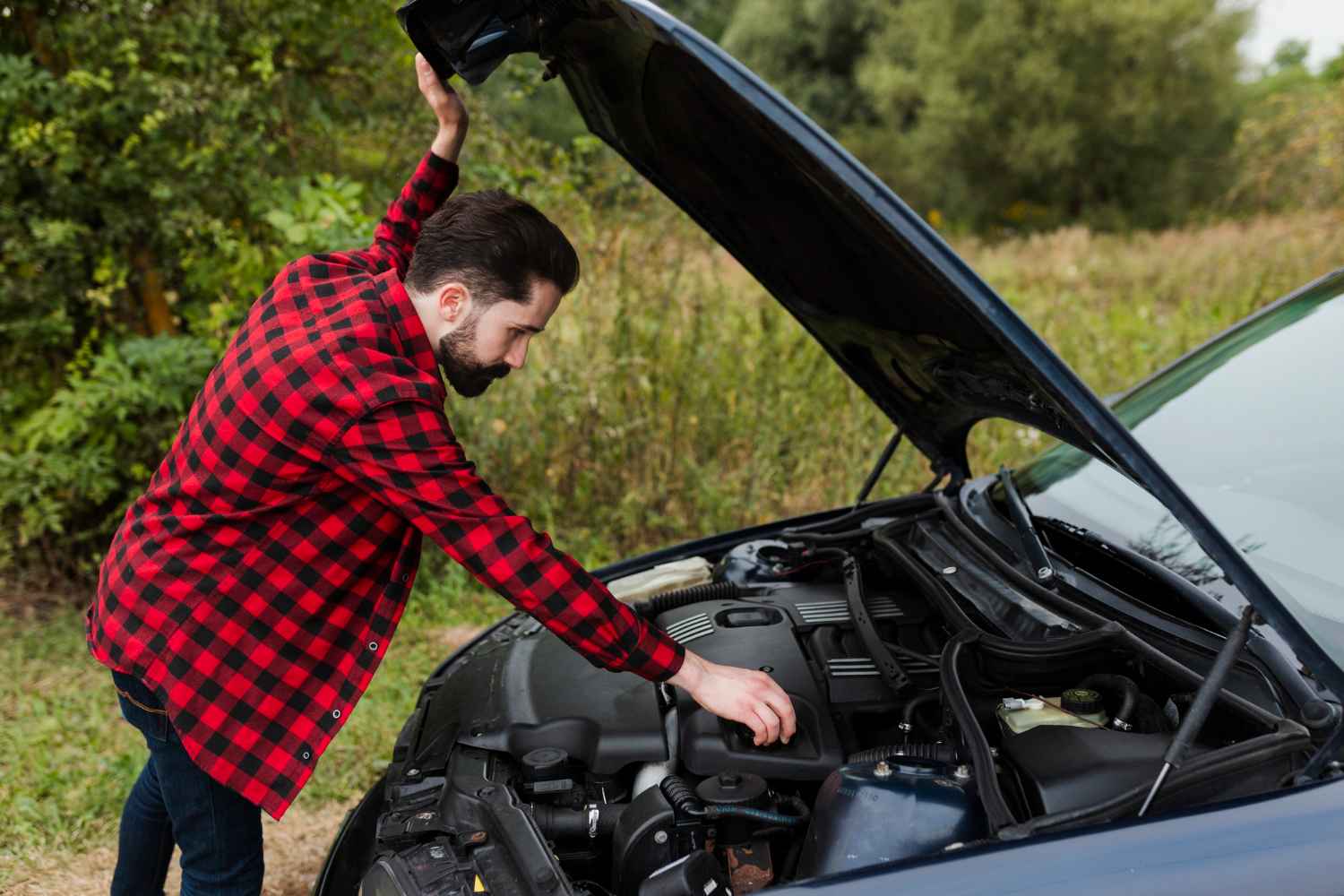There are several common reasons why cars break down on the side of the road, from mechanical failures to simple oversights. Understanding these issues can help you stay prepared and minimise the risks.
In this guide, we’ll explore the 10 most frequent causes of car breakdowns and offer some practical tips to avoid them. Keep yourself informed to maintain the proper operation of your car and to guarantee your safety while driving.
Dead or Weak Battery
Batteries lose efficiency over time, typically lasting around 5 years under normal conditions. Extreme temperatures and frequent short trips can reduce their lifespan even further. To help avoid battery issues:
- Check Battery Terminals: Make sure the battery terminals are tight and free of corrosion by regularly inspecting them. Use petroleum jelly, lubricant, or battery terminal protection spray to stop corrosion.
- Keep It Clean: Make sure the battery’s top is dry and clean.
- Fully Charge: If you drive your car for short distances a lot, you should occasionally take it for a longer journey to let the alternator fully charge the battery.
- Turn Off Accessories: Make sure that all electrical devices, such as lights, heater blower, rear defroster, etc., are off before turning on the engine.
- Inspect Alternator Belt: Make sure the belt is properly tensioned on a regular basis.
- Test the Battery: When you notice any symptoms of difficulty, such delayed starting or dim headlights, have the battery examined. Every year, at least one test ought to be conducted.
Flat tyre or Other Tire/Wheel Damage
Flat tyres are sometimes unavoidable, but you can reduce the risk of premature wear, blowouts, or tyres coming off the bead with proper precautions. To help avoid these problems:
- Monitor Tire Pressure: Regularly check tire pressure and condition. If you have a spare, remember it.
- Adjust for Load: If you carry a heavier load, adjust tyre pressures to the recommended ‘full-load’ levels and return them to normal after unloading.
- Inspect After Curbing: As soon as you can after hitting a curb when parking or driving, make sure the wheel and tire are in good condition.
- Carry Repair Foam: Consider keeping a can of tyre ‘instant repair’ foam in your car.
- Check Tools: Verify that the automobile has the jack, lug wrench, and, if necessary, the equipment for locking wheel bolts, and that you know how to use them.

Alternator Faults
The alternator is in charge of charging the battery; if it malfunctions, the battery will eventually run out of electricity while attempting to start the vehicle. The following are early indicators of a voltage regulator or alternator problem:
- Weak Battery and Dim Headlights: These problems can indicate alternator issues, especially when the engine is running.
- Squealing Sound: When using high-load accessories or at a specific RPM, a squealing sound under the hood could be an indication of a slipping alternator belt.
- Charging Warning Light: An issue may be indicated by a flickering charging warning light (often orange) that turns off when the engine is accelerated. If the light appears while you’re driving, pull over as soon as you can to look at it
Failure of the Starter Motor
While some automobiles may have starting problems after 250,000 miles, some might have problems sooner. Although there isn’t much that can be done in the way of preventive maintenance, be aware of the following symptoms:
- Grinding Noises: Metallic grinding sounds when trying to start the engine.
- Slow Cranking: The engine starts more slowly than usual, which could be a sign of a dead battery.
- Clicking Sound: There is a click from under the hood, but there is no engine turnover when turning the key to the ‘start’ position, which might indicate a battery problem.
Distributor Cap or Ignition Rotor Problems
This might not apply if your automobile was manufactured in the twenty-first century or has a diesel engine because most new cars do not have distributor caps. Make sure it gets checked during routine maintenance if you have one. Symptoms of an issue consist of:
- Engine Misfire: Malfunctioning, particularly when driving uphill or accelerating.
- Rough Running: Rough running, particularly in damp weather.
- Starting Difficulties: Beginning issues, particularly in rainy conditions.
Running Out of Gas or Filling with the Wrong Type of Fuel
A common occurrence for drivers is running out of petrol. Although less frequent, filling a diesel-powered vehicle with petrol is still possible. To stay clear of these problems:
- Fill Up Early: Before beginning a lengthy trip or when the weather becomes chilly or dark, fill up the tank.
- Monitor Fuel Gauge: Keep an eye on the gasoline gauge and act quickly—especially in unknown regions—before the warning light illuminates.
- Know Your Fuel: If you’re driving a new, rental, or borrowed car, ensure you know the correct type and grade of fuel. Filling a luxury automobile with normal won’t be too bad, but filling a diesel engine with regular won’t. If this occurs, roll the car away from the pump and have the tank emptied by a mechanic instead of starting the vehicle.

Broken Clutch Cables
Cars with manual gearboxes are affected by this problem, while others feature hydraulic clutches that don’t require a cable. If the clutch cable breaks, you will not be able to release the clutch, therefore avoid difficult
- Routine Checks: During tire rotations and oil changes, make sure the clutch cable is inspected and greased.
- Watch for Symptoms: The cable might stretch if the clutch feels ‘strange’ when pressing the pedal or the gears grind when shifting.
Fouled Spark Plugs
The majority of cars affected by this problem are elderly or have significant mileage. If oil gets into the chamber or if the fuel mixture is too rich, spark plugs may foul. To stay clear of issues:
- Replace Often: Modern cars should have new spark plugs installed roughly every 50,000 miles, or at the manufacturer’s recommended intervals.
- Performance Monitoring: Keep an eye out for engine misfires, a harsh idle that becomes smoother as the car heats up, and trouble starting the engine, particularly in rainy conditions.
Bad Ignition Wires/Coil Packs
Thick wires are used in older autos to deliver high-voltage energy to the spark plugs. The coil is often located just above the spark plug in newer cars. Problems may arise from them deteriorating with age and heat.
- Engine Misfire: Misfiring, especially when accelerating or driving uphill.
- Starting Trouble: Difficulty starting the engine, particularly in damp weather.
- Rough Running: Sloppy running in the rainy season.
Leaking Cylinder Head Gasket
Leaking cylinder head gaskets are serious problems that need extensive engine work. Although there’s not much you can do to prevent this issue, keeping your cooling system in good working order can help. Watch out for these indications:
- White Smoke from Exhaust: This can indicate a head gasket problem.
- Reduced Power: Loss of engine power may point to a leak.
- Constant Refilling: If oil or coolant needs frequent refilling, it could be a sign of trouble.
- Oil in Coolant or Coolant in Oil: This usually appears as a frothy ‘milkshake’ in the fluids.

Top Tips for Avoiding a Car Breakdown
One of the most annoying issues that every driver fears is breaking down. Therefore, instead of bashing your car with a stick while you wait for assistance, use these helpful tips to help you prevent a breakdown in the first place:
- Never Miss a Service: A regular service ensures your car stays roadworthy and helps address faults before they escalate into serious problems. Make sure your car also has a valid MOT.
- Drive Properly: Your driving style directly impacts your car’s health. Steer clear of clutch riding, forceful stops and starts, and engine revving in cold weather. To avoid putting stress on the brake pads, brake smoothly.
- Don’t Overload Your Car: Excessive weight stresses your car, especially on the suspension and brakes. Get rid of the junk and rent a van to move large, bulky objects like furniture.
- Don’t Ignore Warning Lights: If a warning light comes on, have it checked out promptly to avoid bigger, costlier repairs down the line.
- Be Aware of Strange Noises: If your car starts making strange noises or feels different to drive, get it checked out immediately. Trouble starting or lacking power could indicate the need for new spark plugs.
- Take Out Breakdown Cover: If you become unexpectedly stranded, roadside help will get you back on the road as soon as possible.
Contact Us for Prompt Roadside Assistance
At Fast Recovery London, we understand the frustration of car breakdowns. If you are stuck on the road, don’t hesitate to contact us for fast, reliable roadside assistance. Our experienced team is available by phone and will help you get back on track.
You may save time, money, and stress by being aware of what to look out for and taking preventative measures. Maintain the best possible condition for your car and never forget that assistance is always available.

